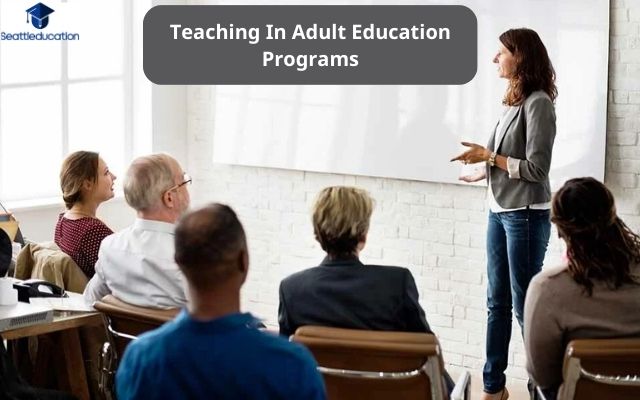Jobs After Teaching: Exploring Exciting Career Paths
Teaching is a rewarding career, but eventually it’s time to move on. What jobs after teaching do you choose? Finding your way in the “real world” can be challenging, particularly if you’ve been an educator for a while.
In this post, we’ll go over some of the best ways to leave teaching and find a new position where you can put your knowledge and expertise to use. We’ll also provide tips for navigating the transition process so you can ensure success in your next endeavor.
Working In Educational Technology
Teaching can be an incredibly rewarding career. It allows you to help students grow, learn and make a difference in the world.
However, after years of teaching, many people feel ready for a change and look elsewhere for new opportunities. One great option is educational technology. Educational technology involves leveraging digital tools such as computers, tablets and interactive whiteboards to enhance learning experiences. This field provides teachers with the opportunity to stay connected with their passion while also exploring something new.
Educational technology offers plenty of different roles including software developers, sales representatives or support specialists. This field calls for skills in both education and technology, making it an excellent opportunity for previous educators who wish to use their knowledge in a different environment.
Furthermore, there are many job vacancies, so if you have the necessary talents, obtaining employment shouldn’t be too difficult. Even better, these jobs often come with higher salaries than traditional teaching positions – another nice perk!
All things considered, switching from teaching into educational technology could be an ideal move for those looking for something new and exciting.
Branching Out Into Different Industries

Teaching provides a solid foundation of skills and knowledge that can be applied to many different industries. It’s easy to branch out into other areas after teaching, whether you decide to stay within the same field or explore something entirely new.
Here are some popular job options for former teachers:
Within Education
- Continuing Teaching: Take on part-time roles as an education consultant, tutor, mentor, or even continue teaching in another school district.
- Administration Positions: Become a principal, superintendent, administrator, curriculum specialist, or special education supervisor.
Outside Education
- Business Careers: Leverage your educational background to become a market research analyst, organizational trainer/consultant, human resources professional, operations manager, or communications director.
- Other Fields: Consider transitioning into public relations work; writing books; working as an editor; becoming a coach; pursuing government positions; entering the IT sector; creating programs for nonprofits; launching entrepreneurial ventures; or joining advocacy groups.
No matter what path you choose when branching out from teaching, there is no shortage of career opportunities available to you. With the right amount of planning and preparation–and perhaps a bit of creativity–you’ll have plenty of chances to take your skills and experience in exciting new directions!
Becoming A Coach Or Mentor
Becoming a coach or mentor can be an ideal job after teaching. Not only does it involve utilizing the same skills of instruction, but also provides unique opportunities to help others reach their full potential.
Coaches are typically employed by schools and athletic organizations to provide guidance on various sports teams while mentors often work with at-risk youth in order to provide support and advice.
Coaching involves more than just helping athletes improve their physical abilities; it requires understanding each athlete’s strengths and weaknesses and providing motivational feedback that encourages them to succeed.
Mentoring is focused on connecting with individuals through patience and empathy, allowing mentees to develop trust in their mentors which helps create meaningful relationships over time.
Both roles require strong interpersonal communication skills as well as knowledge about applicable subject matter, making them great jobs for those who have taught before.
All in all, becoming a coach or mentor is a rewarding experience that allows former teachers to continue using their expertise in new ways.
Pursuing Leadership Positions

Leaving the teaching profession can be an intimidating prospect. After spending so much time in a single career, it can feel like you’re jumping into the unknown! But with the right knowledge and strategies, you can find success and satisfaction in leadership positions that may have previously been out of reach.
From corporate managers to nonprofit directors, there are countless opportunities for those who wish to move up the ladder. Here’s just a few:
- Operations Managers: Run day-to-day operations for businesses or teams within large organizations.
- Marketing Directors: Lead marketing efforts by setting objectives and developing plans to increase brand awareness.
- Finance Executives: Develop financial plans and manage budgets while ensuring regulatory compliance.
No matter which route you choose, taking on a leadership position is sure to open new doors – both personally and professionally. With hard work and dedication, your ambitions will become reality as you create meaningful change in your industry.
Transforming Into An Administrator

Moving from teaching to a leadership position can be an exciting transition. It opens up the opportunity for one to have more influence in their organization and community. While it can seem intimidating at first, with a few simple strategies, you can make the move into an administrative role quickly and effectively.
To start off on your journey towards becoming an administrator, below is a table that outlines some of the key steps needed:
- Develop relationships with colleagues and administrators in your current school or district.
- Take part in professional development opportunities relevant to administration
- Look for potential job openings related to administration roles.
- Utilize any available resources such as mentorships or internships focused on preparing individuals for leadership positions.
- Start applying for these jobs and prepare yourself for interviews by researching the company values, mission statements, etc.
By networking within your current environment and taking advantage of educational growth opportunities, you will gain the skills necessary to become an effective leader who can help shape their school’s future direction. Additionally, actively looking out for job postings and utilizing mentorships are essential components of ensuring success when transitioning into an administrative role. So don’t wait – get started today!
Exploring Higher Education Opportunities

Teaching is an incredibly rewarding profession that provides many opportunities to make a positive impact in the lives of students. However, there may come a time when you’re ready for something new.
- There are numerous career paths available for those with teaching experience.
- Exploring higher education options can be one way to diversify your skillset and expand your professional network.
- Working in higher education could mean taking on roles such as academic advisor, admissions counselor or professor at colleges or universities.
- You would have the opportunity to work closely with students while furthering their knowledge by providing guidance within their chosen field of study.
- Additionally, engaging with faculty members from various departments could open the door to more research-based projects and collaborations.
With so many potential pathways ahead, exploring higher education is sure to lead you toward exciting possibilities.
Starting A Business Or Consulting Gig

Starting a business or consulting gig is an attractive option for many teachers looking to transition out of their current role. It provides the opportunity to capitalize on skills you’ve developed over your years teaching, as well as take advantage of new ones.
With this type of career change, here are some key items to consider:
- Identify what service, product or skill you want to offer and who will be your target market
- Do research into legal requirements such as registering with local authorities and obtaining insurance coverage
- Create a plan outlining how you’ll generate customers and manage finances
Having done your preparation work and put together necessary resources, it’s time to get started!
Building relationships with potential clients through networking events or online channels can help set the foundation for success. Additionally, developing a strong brand presence on social media helps create awareness about your services among prospective customers.
With hard work and dedication, you can turn your expertise in education into a thriving business venture!
Conclusion
Transitioning from teaching to another career can be intimidating. However, with the right qualifications and knowledge of available jobs, it’s entirely possible!
There are plenty of options out there for educators looking to make a change, whether that means exploring educational technology, becoming a coach or mentor, pursuing leadership positions in education, or transitioning into administration. With the right resources and support system, I’m confident that I can find an exciting new job outside of traditional teaching roles. It’s time to start my journey towards discovering what else this world has to offer!







